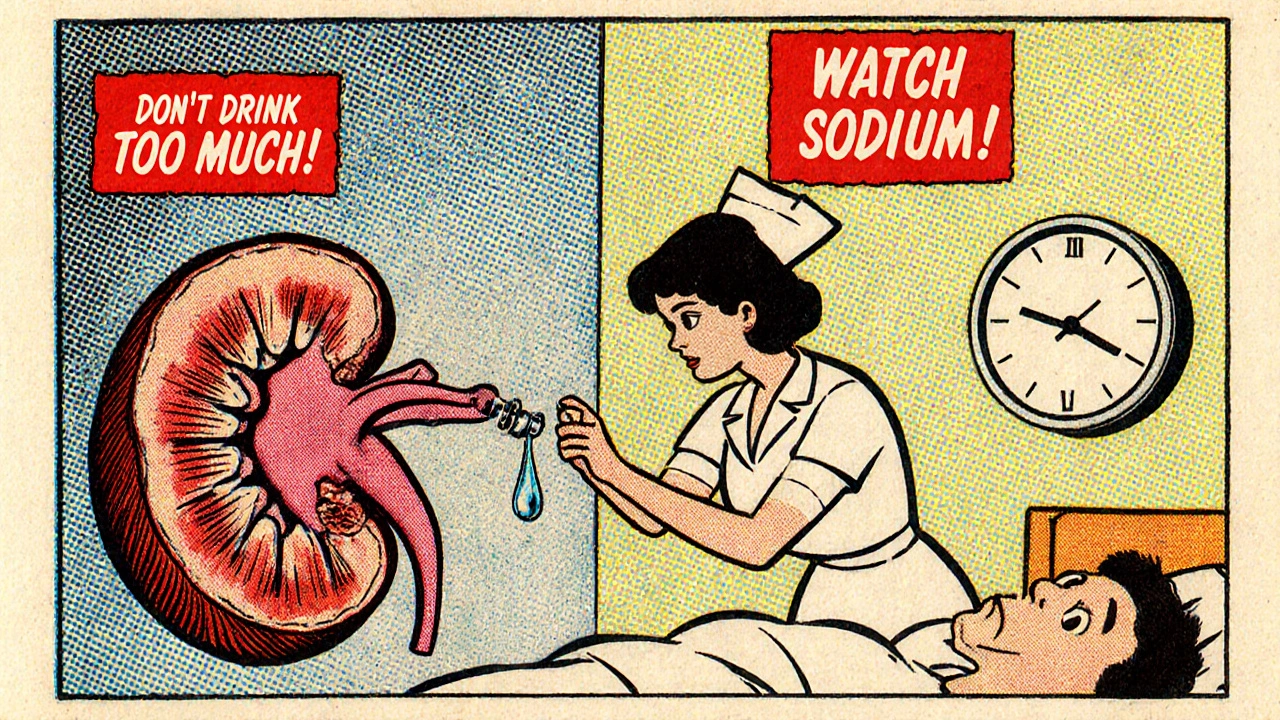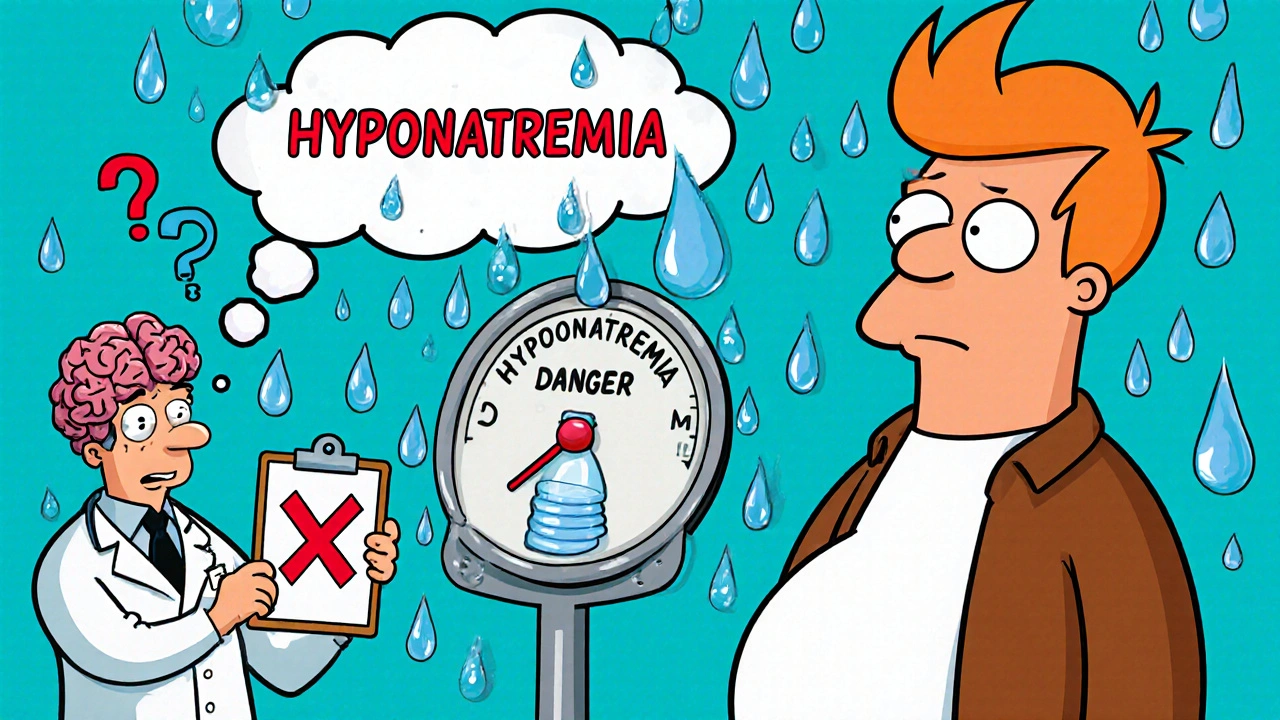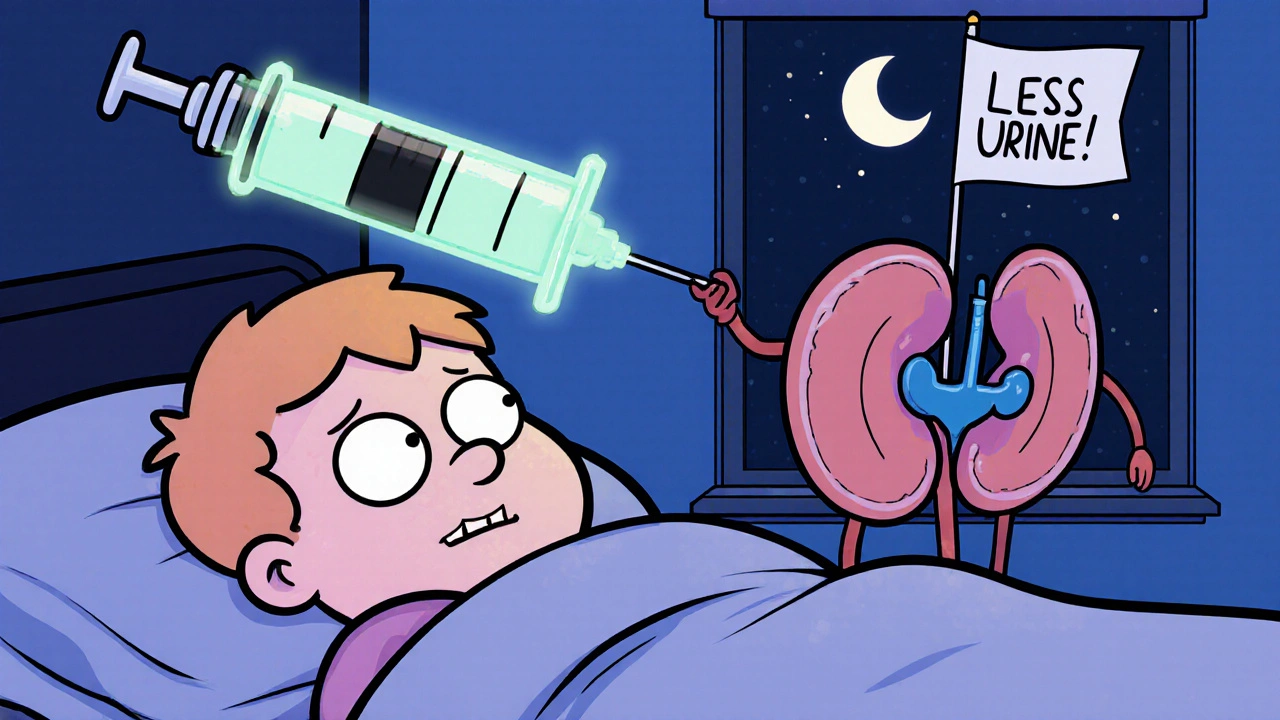Desmopressin injection is a synthetic version of a hormone your body naturally makes - vasopressin. It’s not a painkiller, not an antibiotic, and not something you take for a cold. But when used correctly, it can stop dangerous fluid loss in people with specific medical conditions. This isn’t a drug you pick up over the counter. It’s given in hospitals or clinics, often under close supervision, because getting the dose wrong can lead to serious problems.
What Is Desmopressin Injection Used For?
Desmopressin injection works by telling your kidneys to hold onto water instead of flushing it out. This reduces urine output and helps balance fluids in your body. It’s approved for three main uses:
- Central diabetes insipidus - a rare condition where your body doesn’t make enough vasopressin, causing you to pee out liters of water a day, feel constantly thirsty, and risk severe dehydration.
- Bedwetting in children - when other treatments have failed and the cause is linked to low nighttime vasopressin. The injection is rarely used for this, but it’s an option if oral forms aren’t tolerated.
- Before or after surgery - especially for people with certain bleeding disorders like mild hemophilia A or von Willebrand disease. Desmopressin helps boost clotting factors temporarily, reducing bleeding risk during procedures.
It’s not used for kidney disease, heart failure, or general dehydration. Using it for the wrong reason can cause your body to retain too much water - which is dangerous.
How Does It Work in the Body?
Your kidneys normally respond to vasopressin by reabsorbing water. In people with central diabetes insipidus, that signal is missing. Desmopressin replaces it. It binds to receptors in the kidney’s collecting ducts, making them more permeable to water. Less urine is made, and blood sodium levels stabilize.
In bleeding disorders, desmopressin triggers the release of von Willebrand factor and factor VIII from storage sites in blood vessels. This boosts clotting ability for 6 to 12 hours - just long enough to get through surgery or a minor injury.
The effects start within 15 to 30 minutes after injection and last about 8 to 12 hours. That’s why it’s often given right before bedtime for bedwetting or just before surgery.
Common Side Effects
Most people tolerate desmopressin injection well, but side effects do happen. The most common ones include:
- Headache
- Nausea
- Mild stomach pain or cramps
- Flushing or warmth in the face
- Feeling unusually tired
These usually go away on their own. But if you’re given this medication in a hospital, staff will watch you closely - especially for signs of low sodium, which can sneak up fast.
Low sodium (hyponatremia) is the biggest concern. It happens when your body holds onto too much water, diluting the salt in your blood. Symptoms include confusion, dizziness, vomiting, seizures, or even coma. This risk is higher in older adults, people with kidney problems, or those who drink too much fluid after the injection.
Precautions and Warnings
Desmopressin injection isn’t safe for everyone. Here’s what you need to know before receiving it:
- Don’t use if you have low sodium levels - giving desmopressin when your sodium is already low can make it dangerously worse.
- Avoid excess fluids - for at least 24 hours after injection, especially if you’re being treated for diabetes insipidus. Drink only when thirsty. Don’t force water.
- Use with caution in elderly patients - older adults are more sensitive to water retention and have higher risk of hyponatremia.
- Check kidney function - if your kidneys aren’t working well, your body can’t clear the drug properly, increasing side effect risk.
- Not for type 2 or type 3 von Willebrand disease - it only works for type 1 and some cases of mild hemophilia A.
- Watch for allergic reactions - though rare, symptoms like swelling, rash, or trouble breathing need immediate medical attention.
People with heart failure, uncontrolled high blood pressure, or a history of seizures should be evaluated carefully before use. Your doctor will weigh the benefits against the risks.

How Is It Administered?
Desmopressin injection is given either into a vein (intravenously) or under the skin (subcutaneously). The dose depends on why you’re getting it:
- For diabetes insipidus: 0.4 to 1.0 micrograms per dose, once daily or every 8 to 12 hours.
- For bleeding disorders: 0.3 micrograms per kilogram of body weight, given slowly over 15 to 30 minutes.
- For bedwetting: rarely used as injection, but if so, typically 10 to 20 micrograms at bedtime.
It’s usually given in a clinical setting, especially the first time. Nurses monitor your blood pressure, heart rate, and sometimes your sodium levels before and after.
You won’t be sent home with this form of desmopressin. Oral tablets or nasal sprays are used for ongoing treatment. The injection is for short-term use - like before surgery or during a hospital stay.
What to Do If You Miss a Dose
If you’re receiving this in a hospital, staff won’t miss your dose. But if you’re using it at home under strict supervision (rare), and you miss a dose, don’t double up. Call your doctor. Taking extra can lead to water retention and low sodium - which can be life-threatening.
For bedwetting, if you forget the injection, skip it and wait until the next scheduled time. Don’t give it in the middle of the night unless instructed.
Drug Interactions
Some medications can increase the risk of side effects when used with desmopressin:
- NSAIDs (like ibuprofen or naproxen) - can reduce kidney function and increase water retention.
- SSRIs (like fluoxetine or sertraline) - may increase the risk of hyponatremia.
- Carbamazepine and chlorpropamide - both can enhance desmopressin’s effect on water retention.
- Diuretics - may counteract desmopressin’s effect, but combining them increases risk of electrolyte imbalance.
Your doctor will review all your medications - including over-the-counter drugs and supplements - before giving you desmopressin. Never start or stop anything without talking to them first.

When to Seek Emergency Help
Call 999 or go to A&E if you experience any of these after receiving desmopressin:
- Severe headache or confusion
- Seizures or loss of consciousness
- Swelling in hands, feet, or face
- Difficulty breathing or chest tightness
- Unusual weight gain (more than 2 kg in 24 hours)
These could mean your sodium level has dropped too low. It’s a medical emergency.
How Long Does It Take to Work?
For bleeding disorders, you’ll see improved clotting within 30 to 60 minutes. That’s why it’s given right before surgery.
For diabetes insipidus, urine output drops noticeably within 15 to 30 minutes. Thirst decreases as your body holds onto water.
For bedwetting, it works overnight - reducing nighttime urine production so the bladder doesn’t overfill.
It’s not a long-term fix. It’s a tool - used when you need quick, temporary control.
Alternatives to Desmopressin Injection
If you can’t use desmopressin - because of side effects, drug interactions, or contraindications - other options exist:
- For diabetes insipidus: Oral desmopressin tablets or nasal spray. Thiazide diuretics or chlorpropamide may be used off-label.
- For bleeding disorders: Factor VIII concentrates for hemophilia A. Von Willebrand factor concentrates for type 3 disease. Tranexamic acid for mild bleeding.
- For bedwetting: Behavioral therapy, moisture alarms, or oral desmopressin tablets.
The injection form is reserved for situations where oral or nasal routes aren’t possible - like during surgery, vomiting, or severe nausea.
Can desmopressin injection be used for weight loss?
No. Desmopressin reduces urine output by making your body hold onto water, not fat. It does not affect metabolism or appetite. Using it for weight loss is dangerous and can cause life-threatening water retention and low sodium levels.
Is desmopressin injection safe during pregnancy?
It’s used in pregnancy only if clearly needed, like for central diabetes insipidus or bleeding disorders. Studies haven’t shown major risks, but fluid balance changes during pregnancy can increase hyponatremia risk. Doctors monitor sodium levels closely and limit fluid intake.
Can children receive desmopressin injection?
Yes, but only under strict supervision. It’s used for central diabetes insipidus in children and rarely for bedwetting when other treatments fail. Dosing is based on weight, and fluid intake is carefully controlled. Side effects like low sodium are more dangerous in young children.
How long can you stay on desmopressin injection?
It’s not meant for long-term use. Most people get it for a few days - before surgery, during a hospital stay, or for acute episodes. Long-term treatment uses oral tablets or nasal spray. Continuous injection use increases the risk of electrolyte imbalances and kidney strain.
What happens if I drink too much water after the injection?
Drinking large amounts of water after desmopressin injection can cause your blood sodium to drop dangerously low - a condition called hyponatremia. This can lead to confusion, seizures, coma, or even death. Always follow your doctor’s instructions on fluid intake - often, you’re told to limit fluids to no more than 500-800 mL in 24 hours after the injection.


Ankita Sinha
November 19, 2025 AT 06:58This is actually super useful info. I had no idea desmopressin could help with bleeding disorders too - I always thought it was just for diabetes insipidus. My cousin got it before knee surgery last year and they monitored her sodium like a hawk. Glad they spelled out the risks clearly.
Also, the part about not forcing fluids? Big win. So many people think 'drink more water = always better' and that’s dangerous here.
Thanks for breaking this down without the fluff.
Donald Sanchez
November 21, 2025 AT 04:43lol so this is like the medical version of a sponge?? absorb water like a champ and then boom - hyponatremia 😂
also why tf do they even make this an injection?? if you're sick enough to need it you probably can't swallow pills??
also also - anyone else think this is just Big Pharma’s way to sell us expensive IVs for something that could be a tablet?? 🤔
Abdula'aziz Muhammad Nasir
November 22, 2025 AT 09:39As a nurse in Lagos, I’ve seen this used for children with central diabetes insipidus - rare but devastating when untreated. The injection is a lifeline, but the real danger is family members giving extra water out of love. We educate them: ‘Thirst is your guide, not the bottle.’
Always check sodium. Always limit fluids. Always monitor.
This drug saves lives - but only when respected.
Tara Stelluti
November 24, 2025 AT 05:43Okay but why is this even a thing?? Like… who decided it was a good idea to make a drug that makes you hold water??
And why do they let you use it at all if the side effects are ‘seizures and coma’??
I feel like this is one of those drugs that exists because someone got paid to invent it, not because it’s actually safe.
Also… who wrote this article? It’s too calm. This should be screaming.
Mary Follero
November 24, 2025 AT 09:01Just want to add - if you’re on SSRIs or NSAIDs, this is a red flag combo. My mom was on sertraline and got desmopressin after a minor surgery. She got confused, started slurring, and they had to rush her to the ER. Sodium dropped to 122.
Doctors don’t always connect the dots. If you’re on antidepressants, tell them you’re getting desmopressin. Don’t assume they’ll know.
Also - if you’re elderly, don’t drink that ‘just one glass’ of water after. Seriously. One glass can be too much.
Knowledge is power here. Share this.
Danielle Mazur
November 26, 2025 AT 05:00Have you ever wondered why desmopressin is only available in hospitals? Because they know what it can do. They know how easily it can be weaponized. The FDA approved it - but who benefits? Who controls the supply?
Think about it: a hormone that manipulates your body’s water balance. Controlled. Monitored. Restricted.
What if this was used for population control? What if it was added to water supplies under the guise of ‘hydration therapy’?
They say it’s for diabetes insipidus… but what else is it for?
Stay vigilant.
Will Phillips
November 27, 2025 AT 21:02THIS IS WHY PEOPLE DIE FROM WATER INTAKE
YOU THINK DRINKING WATER IS GOOD UNTIL YOU’RE HOLDING ONTO TOO MUCH
EVERYONE THINKS THEY KNOW WHAT’S HEALTHY BUT NOBODY READS THE FINE PRINT
IF YOU’RE ON THIS DRUG AND YOU’RE DRINKING WATER JUST BECAUSE ‘IT’S GOOD FOR YOU’ YOU’RE A DEAD MAN WALKING
THEY DON’T TELL YOU THIS ON TV
THEY DON’T TELL YOU THIS ON INSTAGRAM
THEY DON’T TELL YOU THIS IN THE AD
YOU HAVE TO FIND IT HERE
SO THANK YOU
AND NOW YOU KNOW
Arun Mohan
November 28, 2025 AT 20:22How quaint. A synthetic vasopressin analog - a Nobel-level biochemical innovation - reduced to a mere ‘bedwetting fix’ for American children.
Meanwhile, in proper medical systems, we use it for acute neurosurgical cases, not as a bedtime lullaby for toddlers.
And yet here we are, treating a precision endocrine tool like a magic spray from a Walmart aisle.
Medicine has become a circus. And desmopressin? It’s the clown who knows the truth - but no one listens.
Tyrone Luton
November 30, 2025 AT 17:01It’s interesting how we treat hormones like switches - flip this one, fix that. But the body isn’t a machine. It’s a dance. Desmopressin forces one step in the dance - and if you don’t know the rhythm, you trip.
Water retention isn’t a side effect. It’s a consequence of ignoring the whole system.
We fix symptoms, not context.
And that’s why people end up in the ER.
Jeff Moeller
December 1, 2025 AT 06:42It’s wild how something so simple - telling your kidneys to hold water - can save lives or kill you. Biology is elegant that way. No magic. No miracle. Just chemistry. And humans keep forgetting that.
Use it right. Respect the dose. Don’t chug water.
That’s all.
Kenneth Meyer
December 3, 2025 AT 05:25One sentence: Desmopressin is the quiet hero of endocrinology - precise, powerful, and perilous if misunderstood.